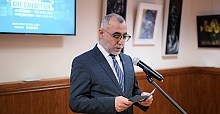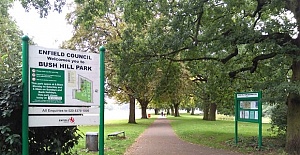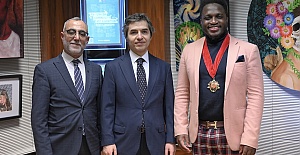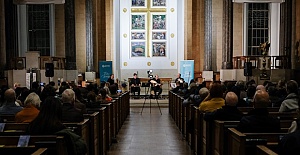Turkish, Kurdish and Turkish-Cypriot migrants have created their social and cultural space in London. Lots of the first generation Turkish migrants always have been keeping the idea of returning back to homeland. Consequenly, first they came to England and left their family behind, but returning back always has been postponed. they therefore have found the way to have brought their family to join them in England. As a result of this, population of Turkish migrants living in England has rised. At the end, returning back seemed difficult; that tendency has caused their children in contradictions adapted to England. The legand of back to homeland had been just a theorical idea, it has lost its aim in practical discourse: England has been their second nation.
The understanding of their reason to come to England is mostly based on economic and social networks such as kinship relations. They find it easy to establish their work and earn money, at the same time staying with their family in their environment has helped them reproduce their emotional and cultural aspects in a relatively strong manner.
The process of integration may have its class’s alignments. Especially, rich Turkish speaking migrants who have a good life standard in the receiving society can be said to be in the process of integration. The locations where they have settled may reflect the duration of the interaction with the receiving society. Being in the process of integration depends on different situations like life standard, mobility, language, duration of the interaction with the receiving society. Cypriot-Turkish has been assimilated in British society easily, because they migrated earlier than the other Turks. The gap therefore between the generations in time plays crucial factor. Migrants' migration process, their conditions and reasons on immigration are determinative features of their cultural consumption experiences in the receiving society.
The movement of immigrants, the intensity of the interaction and intercorrelation between the immigrants and the movement of information and ideas both outside in Britain and abroad seem that the diversity in the dimensions of the process of integrationhas complicated the cultural interdependency of the Turkish speaking people in London. Thus the transnationalism could be placed into the process of individuation that may correspond to lowering the level of cultural projection as the personal expectations are subjected to the demand of the alienation.
The changes in the process of integration towards creating new social forms of immigration could be coupled with the complications in the process of transnationalism since the twentieth century communications revolution has enabled transnational actors to move away from their local socialisationprocess. This may be because the growth of interdependence may have created a permissive climate for transnationalism to penetrate the diverged fragmentation of the immigrants. Under such changed circumstances, undermining the social dependency by the means of remote communication may soften the bonds between the immigrants and their cultural background embodied in daily social relations that might produce linklessrelations which could be characterized by a sense of constant insecurity.
Therefore, integration as a process has been extended to a point where the transnational actors in effecting immigrants dissolve in an evolution of the adopted culture and life conditions. Hence the actors themselves that form the basis for integration are also subjected to the changes accordingly but in unpredictable and unforeseen circumstances.


 After Nesil Caliskan a by-election will be held in Jubilee ward in Enfield
After Nesil Caliskan a by-election will be held in Jubilee ward in Enfield Publishing the analysis, Labour’s Cllr Ergin Erbil said Everybody in Enfield deserves basic rights
Publishing the analysis, Labour’s Cllr Ergin Erbil said Everybody in Enfield deserves basic rights Gaza-Israel conflict Statement from Cllr Ergin Erbil, Leader of Enfield Council
Gaza-Israel conflict Statement from Cllr Ergin Erbil, Leader of Enfield Council Cllr Ergin Erbil was elected as the new Leader of Enfield Council
Cllr Ergin Erbil was elected as the new Leader of Enfield Council The European Union called on Turkey to uphold democratic values
The European Union called on Turkey to uphold democratic values Turkish citizens in London said Rights, Law, Justice
Turkish citizens in London said Rights, Law, Justice The Council of Turkish Cypriot Associations Geneva response letter
The Council of Turkish Cypriot Associations Geneva response letter Sustainable Development and ESG, Will This Become the Course for Turkic World
Sustainable Development and ESG, Will This Become the Course for Turkic World Saran Media And Euroleague Basketball Extend Media Rights Partnership for Four More Years
Saran Media And Euroleague Basketball Extend Media Rights Partnership for Four More Years Will Rangers be Jose Mourinho’s next victim?
Will Rangers be Jose Mourinho’s next victim? Jose Mourinho's Fenerbahce face Rangers on Thursday
Jose Mourinho's Fenerbahce face Rangers on Thursday Inzaghi stated that they felt the absence of our national player Hakan Çalhanoğlu
Inzaghi stated that they felt the absence of our national player Hakan Çalhanoğlu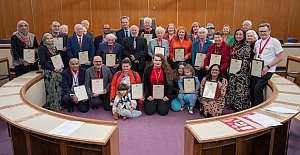 Enfield Council at a special awards ceremony
Enfield Council at a special awards ceremony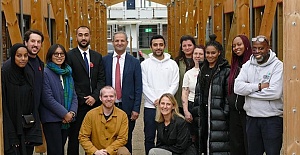 Enfield Council continues to invest in Edmonton, supported by £11.9 million in funding
Enfield Council continues to invest in Edmonton, supported by £11.9 million in funding Survey shows improvements in Enfield Council’s housing services
Survey shows improvements in Enfield Council’s housing services Why is Thames Water in so much trouble?
Why is Thames Water in so much trouble?


